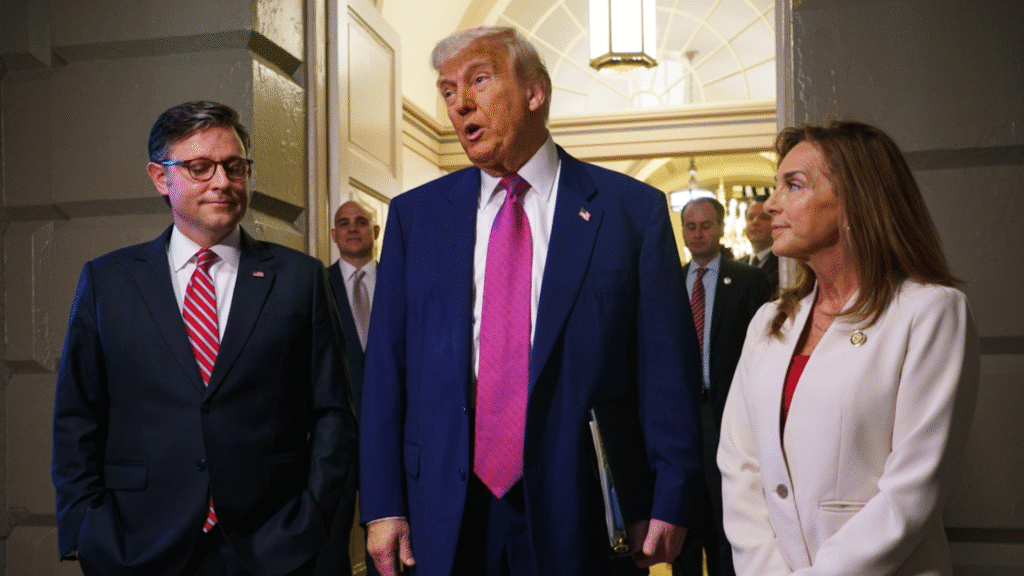
House Republicans on Thursday morning passed President Trump’s ‘Big, Beautiful bill’, marking a major win for Speaker Mike Johnson (R-La.)
The chamber cleared the sprawling package in a 215-214 early-morning vote after days of marathon meetings, intense negotiations that spanned both ends of Pennsylvania Avenue, and a series of last-minute changes to the bill, which were crucial in coalescing Republicans around the measure.
In the end, just two RINOS — Reps. Thomas Massie (Ky.) and Warren Davidson (Ohio) — opposed the legislation. House Freedom Caucus Chair Andy Harris (R-Md.) voted “present.”
Speaker Johnson: "THE (Big, Beautiful) BILL IS PASSED." pic.twitter.com/7v62XZnhGm
— Resist Times (@resistupdates) May 22, 2025
The House bill, titled the “One Big Beautiful Bill Act,” adopting Trump’s slogan for the measure, extends the tax cuts enacted by the president in 2017; boosts funding for border, deportation, and national defense priorities; imposes reforms, like beefed-up work requirements, on Medicaid that are projected to result in millions of low-income individuals losing health insurance; rolls back green energy tax incentives; and increases the debt limit by $4 trillion, among many other provisions.
Its passage marks a massive victory for Johnson, who successfully cajoled scores of Republican holdouts — from hardline conservatives to vulnerable moderates — to support the bill before his self-imposed Memorial Day deadline, muscling it through his razor-thin majority.
“Nothing in Congress is ever easy, especially when you have small margins, but we are going to land this plane and deliver this and we’re proud of what we’ve accomplished together,” Johnson said Tuesday. “Every member of the conference can be proud of this legislation in the end. It’s truly a nation shaping piece of legislation.”
The GOP trifecta is using the special budget reconciliation process to advance the package, which will allow them to circumvent a Democratic filibuster in the Senate.
Looking to take advantage of their full control in Washington, Republicans packed the measure with a host of partisan priorities, putting it on track to be one of the most consequential bills in years and one that will help define Trump’s second term.
Democrats, meanwhile, are working to ensure that definition is one that highlights what analysts say will be devastating impacts for America’s poor — especially as the 2026 midterm elections inch closer.
“This GOP tax scam will force nearly 14 million people to lose their health coverage and cause millions more to pay higher co-pays, premiums and deductibles,” House Minority Leader Hakeem Jeffries (D-N.Y.) said during Wednesday’s marathon Rules Committee meeting. “Hospitals will close, nursing homes will shut down, and people will die in all of your districts.”
While Republicans say they are targeting waste and fraud in programs like Medicaid and beyond, an analysis from the nonpartisan Congressional Budget Office (CBO) found that individuals who make the least amount of money will lose household resources as a result of the bill, while Americans who make the most will gain assets.
But even as Democrats launch their attacks, passage of the legislation is a win for Trump. After the president unsuccessfully lobbied Republican holdouts to support the bill during a rare visit to Capitol Hill on Tuesday, he convened the rabble-rousers at the White House hours before the vote and helped broker an agreement that brought them on board. Opposition to the bill, the White House warned, would be the “ultimate betrayal.”
The legislation, though, has a long way to go before it hits Trump’s desk. The Senate is eyeing several changes to the bill that are certain to spark ire in the House — including watering down Medicaid changes and making some tax provisions permanent — setting the stage for a chamber-vs-chamber fight and a legislative ping-pong across the Capitol.
The clock is ticking. Treasury Secretary Scott Bessent said Congress must raise the debt limit by mid-July to avoid an economy-rattling default, leaving lawmakers little time to hash out their differences and deliver Trump a bill he can sign into law.
Republican leaders have said they want to enact the package by July 4.
Passage of the bill in the House early Thursday morning marks the culmination of a months-long attempt by Johnson and his lieutenants to craft a package that could muster support across the ideologically diverse conference.
In the final stretch, hardline conservatives in the House Freedom Caucus and Republicans from high-tax blue states required the most attention as they dug in on their distinct demands for the legislation.
Spending hawks pressed leadership to expedite the implementation of the enhanced Medicaid work requirements, accelerate the rollback of green energy tax credits enacted by Democrats, and extract enough spending cuts to ensure that the package would not add to the deficit.

